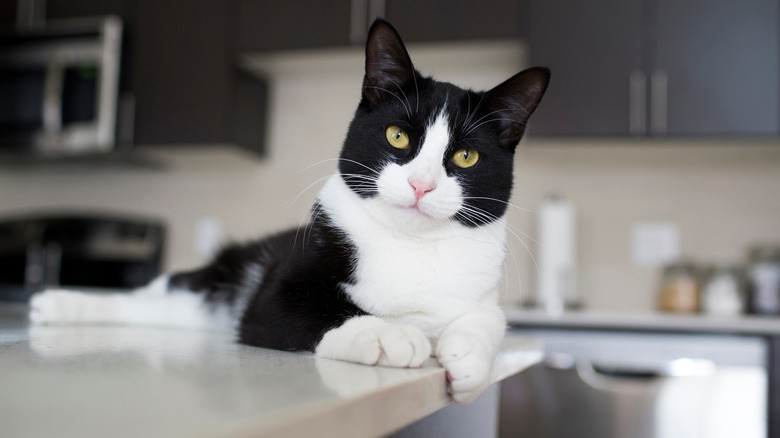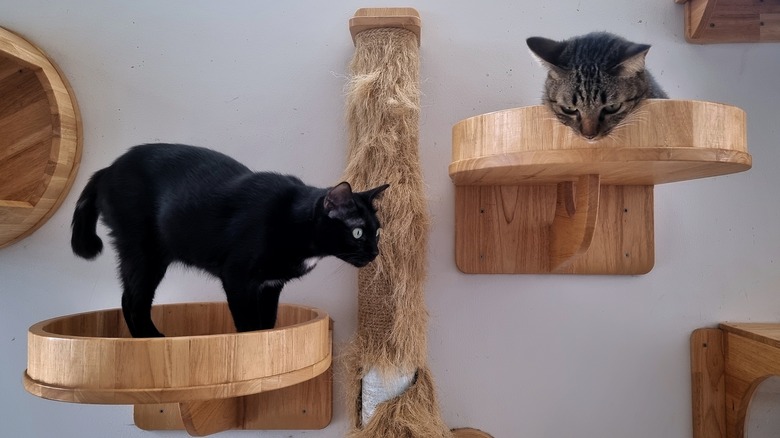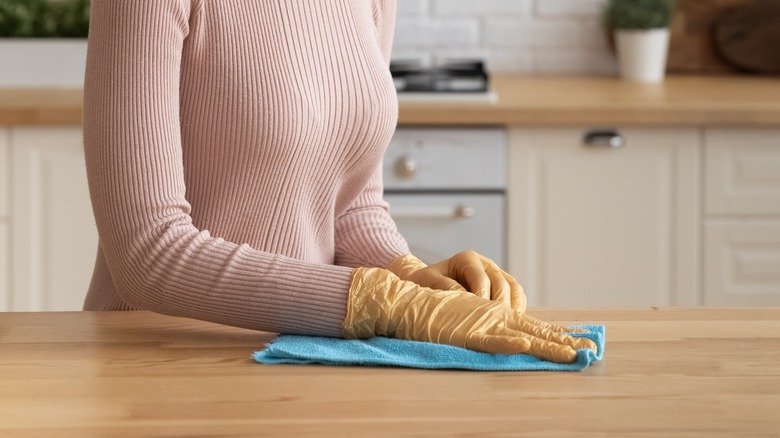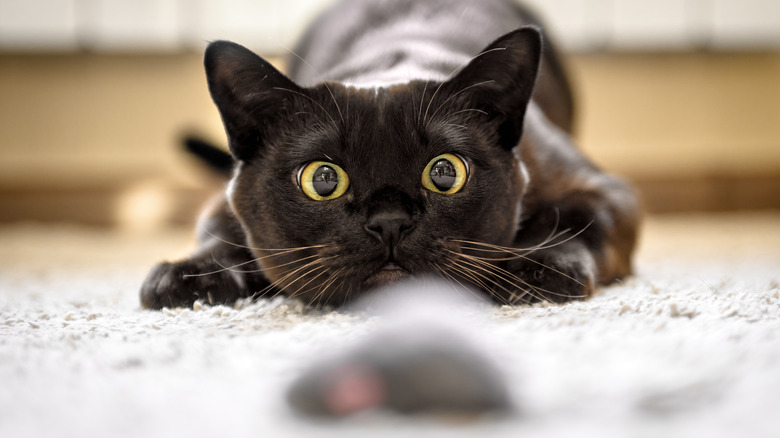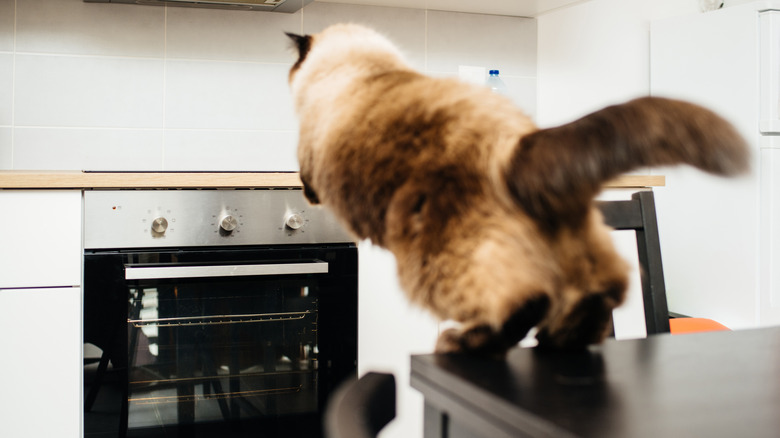5 Tips For Keeping Your Cats Off Your Kitchen Counters
We may receive a commission on purchases made from links.
Pets are one of life's joys, a notion that many people agree on. Unfortunately, not everything that comes along with having them is fun to deal with. One of the more annoying aspects of having a cat, for example, is trying to teach it to stop jumping on the kitchen counters. While cuddling on the couch or finding them on top of bookshelves is cute and fun, kitchen counters are where we prepare our food. Having a feline there who sheds and walks around in a litter box isn't sanitary (via I Heart Cats). Not to mention, cats can jump up and eat our food and possibly get sick, too — so it's best for the health of you and your kitty to keep them off the counter.
To do this, it's best to start by understanding why they are inclined to in the first place. First, kitties love finding high places to watch everything below them, as noted by Killeen Veterinary Clinic. Wildcats use these tactics in nature to stalk their prey and stay safe, so indoor felines are just doing what their instincts tell them to. They also might hop up there if they know there's food or if they like the running water.
It's important to note that all cats are different, and what works for one might not for another. So experiment and find a solution that's suited to your kitty and its specific personality.
Provide jumping alternatives
One of the easiest ways to prevent kitties from getting on counters is by providing them with other jumping alternatives, as noted by Be Chewy. This gives them something to do and satisfies that instinct. For example, cat trees are a great product for those with felines in their home. They come in many styles and sizes, and a tall cat tree can satisfy your kitty's need to be up high, too. Some even come with attached toys and cozy dens for your pet to enjoy; just check out this fancy cat tree from Petco.
However, not everyone has the space for expansive cat trees; luckily, there are other options that can provide your kitty with some height. Notably, cat shelves are popular for those with limited floor space but an abundance of kitty energy. They attach to the wall and can either be a simple shelf or an elaborate system of shelves, bridges, and hammocks. Here is an affordable cat-shelf system from Chewy.
Remove the temptations
According to Sprintally, felines usually jump onto the counter out of curiosity and then find a tasty treat — maybe it was the ham sandwich you left there while answering the phone. Now the kitty associates that area with delicious food, and you'll have a hard time telling them that it's not for them. So, remove any food from the counter to avoid this or discourage it if it's already happening. Additionally, keep the space clean by wiping down the surface. This will remove the smell and the temptation — and if the cat still jumps up, they won't be rewarded with a treat.
If you're not home, and you know the cat will hop onto the counter in your absence, it's essential to keep them out of the room. This way, they can't jump up there and explore without any correction. Similarly, if you know you're going to have food out for a party and you don't want to risk them investigate it, lock them up during the event. Avoiding any reoccurrence of the cat getting food off of counters will help them learn that they don't want to be up there anyway.
Give their brain something else to do
Per Smithsonian Magazine, cats are intelligent creatures with curious minds. However, while this makes them fun to have, it also makes them mischievous. To that end, another reason your kitty might hop up on the counter is because they're bored. Perhaps their food is in the same bowl every day or the water bowl is stagnant, or maybe the toy mouse you bought has outlived its welcome. This calls for revamping their feeding, watering, and toy situation.
Cats love drinking from running water, according to Drinkwell; that's why you might find them interested in faucets. To prevent this, invest in a kitty water fountain like this one from Chewy. They'll love drinking from the moving fluid and likely won't want to investigate the kitchen faucet.
In nature, cats have to spend the entire day hunting and looking for food (via Tractive). In our homes, they go to their bowl and find a full meal waiting for them. Whether dry, wet, raw, or a mixture of all three, this can be boring to a cat. That's why jumping on the counter to look for food might fulfill their need to hunt. Instead, hide food throughout the home where the cat is allowed to go. This is a much more exciting way for the them to eat and will, and will discourage them from searching in places you don't want them.
Make the counter an unpleasant place
Redirecting a cat's attention and providing alternatives is a fantastic way to stop them from going onto the counter, as noted by MSPCA. Unfortunately, it might not work with all kitties, especially stubborn ones. For those who won't take a hint, you might have to resort to other solutions such as making the countertop an unpleasant place to be. Of course, this does not mean harming your cat. However, there are ways to "scare" them away from going up there.
For example, many cat parents line up aluminum foil or baking sheets on the counter to startle the feline when they jump up (via Life is Better With Cats). The sound and unfamiliar material will cause them to hop right back down and make them think twice about doing it again. Similarly, you could drape towels on the edges of the countertop so that when they jump up, they slip right back off. A few cat guardians even use tape lining the countertop to make it uncomfortable for them to walk on. Just be sure not to use an option that's too sticky, or else the cat could be hurt.
Get technology involved
If nothing you're trying is working, you might feel defeated. Maybe the only time you successfully keep your cat off the countertop is when you're home and right there to watch them. This is not sustainable, and when you turn your back, your kitty will be right back where they shouldn't anyway.
Per VCA, in these situations you might want to consider getting technology involved. For example, this spray from PetSafe uses motion detection to set it off and spray a non-toxic mist that will startle a naughty feline. This is perfect for when you leave the house or can't keep a close eye on your pet. The reviews discuss the spray going off and scaring the cat, causing them to hop back down to the floor. Similarly, you could use a Tattle Tale device; it detects movement via vibrations and emits a startling sound to cats. This will make them run away, and repeated exposure should teach your kitty to stay down.
